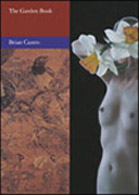 | Brian Castro THE GARDEN BOOK Giramondo, 316 pp. Review by Perry Middlemiss |
[This novel has been shortlisted for the 2006 Miles Franklin Award.]
Let's get one thing straight right off the bat: Brian Castro can write. Unfortunately I have a feeling this is akin to reviewing a play and commenting only on the sets and staging. It amounts to "damning with faint praise", which isn't what I intended, but which does provide some forewarning of my divided opinions of the novel.
The Garden Book tells the story of Swan Hay (born Shuang He), the daughter of a country school-teacher of Chinese ancestry, of her husband Darcy Damon, and of the American aviator-architect Jasper Zenlin, who becomes the love of her life. The main body of the book is set in the Dandenong Ranges outside Melbourne in the period leading up to and during World War II. The novel is framed within the attempts of Norman Shih, a rare-book librarian, to piece together the story of the three from an old diary and a job lot of "Letters, postcards, ledgers, old paperbacks." The story is presented in a series of accounts around each of the characters in turn, in the order in which they enter the plot: Darcy, Swan, Jasper and then Shih to round it out, to tie up the final knots.
That arrangement is reasonable enough. The execution leaves something to be desired, however. Darcy's story is told in the first person as it appears that we are reading from his diary, though this is not made totally clear. He's a strong character, big in body and therefore deemed to be rather slow, though he does actually possess a powerful intellect which slowly manifests itself through the book. Castro is spot-on with his voice and the following quote could have been matched by just about anything from his part of the book.
I only remember my father as a smell. Pipe-bowl shag. His heavy goanna hand reaching round the back of my neck. His boots, ten sizes too big for me, stand empty on the back patio where my pet echidna shuffles back and forth, chiselling at the posts for ants. There's my mother through the kitchen window, boiling up plums for jam. her face is pale; she's sick again. The house is an arsenal of guns and axes. The only family portrait I have. Fleeting happiness tinged with remorse. At least everyone's got clean shirts.The only difficulty with Darcy's story is that Shih keeps intruding without warning; adding to Darcy's story by filling in the gaps between diary entries. How he is able to write in such an omniscient narrative voice is difficult to determine, and starts to grate after a while. This effect is probably accentuated by the fact that it takes a while to work out that it is Shih speaking. I kept wondering why the point of view kept changing and had to keep checking back in Darcy's section to work out what was going it. I found it quite disconcerting.
By the time I got to Swan's part of the book, I'd started to figure out the technique and wasn't so put off by it. That is, until Castro changes his methodology again and starts to interleave entries by Darcy and Swan, each headed by their name. At least he forewarns us this time:
Outside my office window, a jet creases the sky with condensation trails while Swan's entry for this day fades into bluish patches of ink. In the margin near the spine she's teasingly pressed a small blank leaf. The gaps in these notes invite my participation. What does Darcy say?At this point in the book I was starting to think that it was going to be an exercise in technique and structure over plot and story, but things start to pick up when Jasper enters the scene. Darcy and Swan are married and Darcy has fortuitously acquired a degree of wealth which enables him to engage Jasper the architect to build a house and a series of outbuildings for them. The arrival of Jasper completes the triangle, Swan is smitten by his other-worldliness, his charisma and the chance he offers for an escape from a country that barely acknowledges her existence. But the outbreak of war scuttles any hopes she might have of utilising her new-found celebrity as a poet and it all ends as we might expect of such an arrangement, at such a time.
Castro himself has acknowledged that a number of large publishers refused to accept this book in its current form, demanding more changes to the structure and content than he was willing to permit. As a consequence he has taken up with the small Sydney publishing house Giramondo. I believe Castro was right in sticking to his guns and I can see why this novel had difficulty in finding a place. The trouble is I think he should also have taken some notice of the original criticisms. It might have made the book more approachable.
In the end I believe the author has produced a magnificent failure. As I said at the start, the man can write. For days after finishing this book I was still thinking about it, trying to work out what he was up to and how he hoped to achieve it. He got there in the end, but the route he took wandered down paths that left this reader feeling more than a little lost a lot of the time.
[Update: I originally identified this book's publisher, Giramondo, as being Melbourne based. It is, in fact, located in Sydney.]
